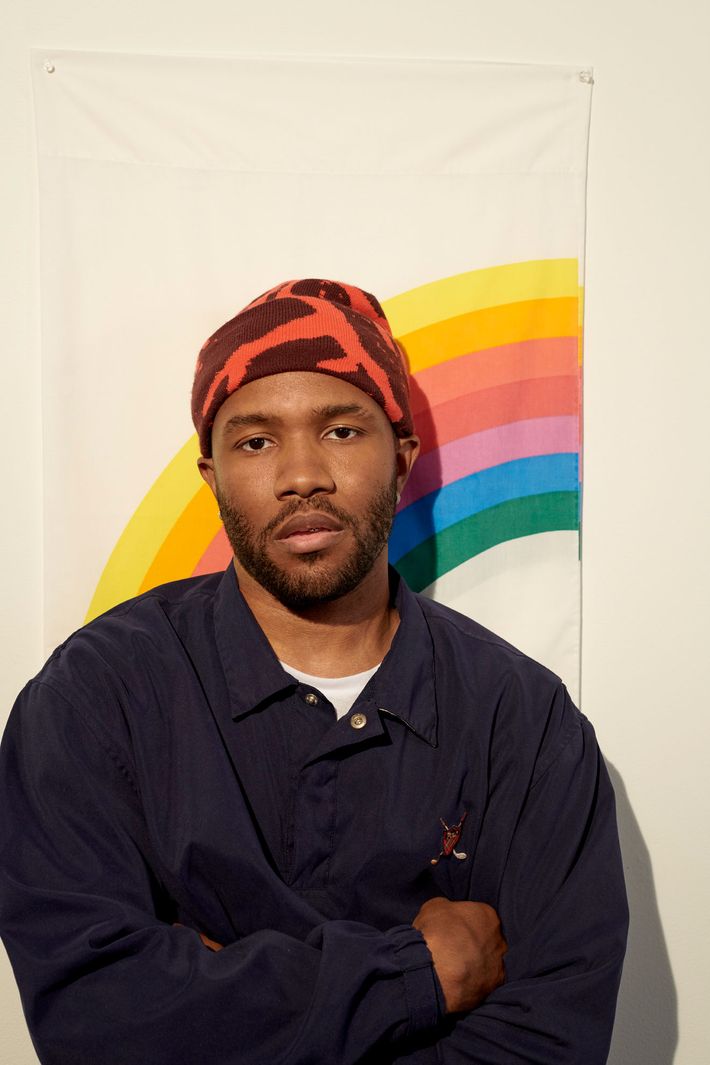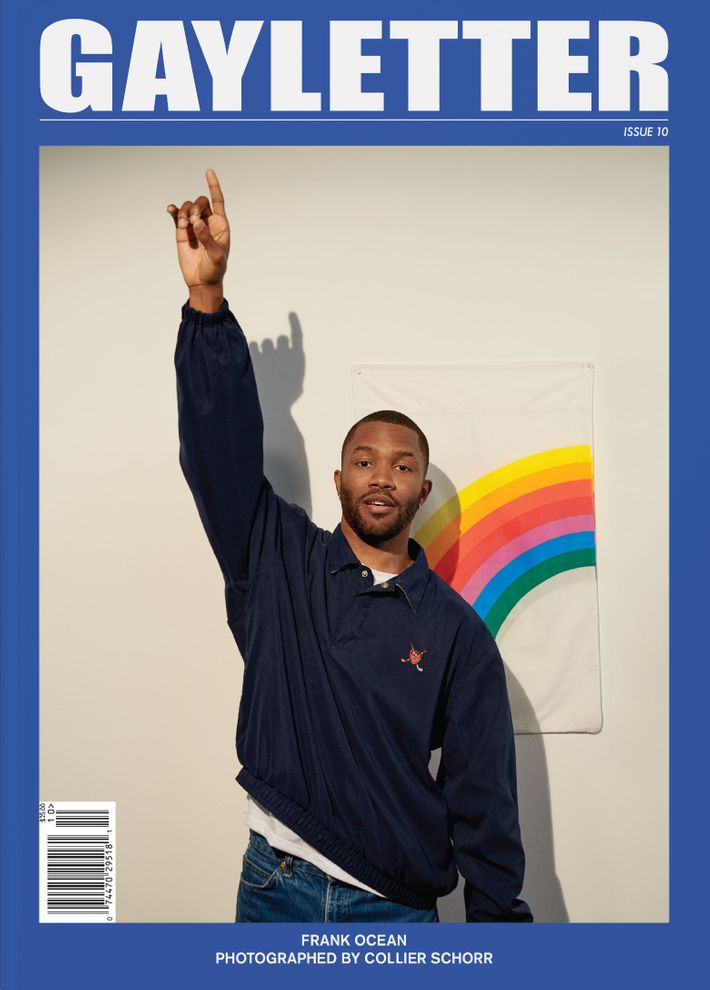Frank Ocean doesn’t do a whole lot of interviews. As he explained in one he did with GQ last fall, conducted by the people who co-host his Apple Music radio show, his worry, unsurprisingly, is that “you could potentially be misrepresented.” However, “social media helps that, ‘cause you’re fully in control and can message that how you want.” (As it happens, he’d just made his Instagram public.) So it’s a rare thing that he did an interview in the new issue of Gayletter, the New York–based, twice-a-year queer cool-kid culture magazine that has made a name for itself with pieces like Susan Sarandon in drag.
How’d they land Ocean? “We noticed that Frank followed us back on Instagram,” remembers Tom Jackson, who did the interview together with his co-editor Abi Benitez. Thus began a discussion of collaborating on something, and he agreed to be shot by Collier Schorr. (The rainbow he’s posing in front of came from her childhood bedroom; she’d found it in her parents’ attic in Florida.) “It took a long time for it to all come together,” says Jackson. “He is very intentional.” Which is clear when you read the piece: In it, he discusses his TV preferences (Chef’s Table and The Handmaid’s Tale), why he loves rock climbing, Big Freedia, and what the gay bar was from his song “Good Guy” (Boxers HK).
Read the full interview here. Some of the good parts are excerpted below:
Do you watch RuPaul’s Drag Race?
Sometimes. I have a friend who really likes it, so I’ve seen a few episodes. But I don’t really keep up with it like I should.
Would you ever be a judge on it if they asked you?
I’ll say this: Of all the talent shows on TV, that would be the most likely. RuPaul has this famous quote: “We’re all born naked, and the rest is drag.”
Do you think of “Frank Ocean” as a drag persona, or is there now no separation between Frank Ocean the artist and you?
Hmm, that’s interesting. I’ve never considered that. For me, the genesis of that name change came from me trying to make a project without my label knowing about it. It was born from a need. It came about in such a way that I didn’t think about whether it was armor for me …
Do you use dating apps?
I don’t use dating apps. I’ve been in a relationship for three years. I definitely wasn’t using dating apps before then. I don’t think I would use dating apps now. I fuck with Marc Jacobs’s philosophy on that, so I wouldn’t rule it out, but it is a little hectic being a famous person on dating apps.
Have you listened to the Dissect podcast on your albums?
I know that he does that, but it’s too close. I can’t do it. I definitely only hear good things about it, but listening to something like that, you could probably imagine … it’s just awkward.
You recently made your Instagram public. What do you like about the platform?
I had it there for a while — for my friends, for real life and this alternative life online. It’s just another form of expressing yourself. I think there’s something thrilling about being able to show a whole lot of people a little bit of your life and your experiences. Even though you can’t comment on my page … [Laughs] It’s more like TV — you can’t comment on TV.
How do you keep yourself protected as an artist in the music business?
Well, fucking with major music companies, you’re going to be … deflowered. Anytime you get into the business side of the arts, there has to be some degree of objectification or commodification that you’re comfortable with, of yourself and of your work. I don’t know about purity. It depends on what you want. A lot of people I talk to about careers in the music industry, their ideas of success have to do with nostalgia. They have to do with tropes of success, things they’ve been shown over the years that represent what a successful career is. I think that helps you become prey, because somebody can manipulate you with those things. Then you may get to a point in your experience where you become disillusioned with those things. So anybody having a clear idea — even if it’s as crass as “how much money do I want to make, specifically?” — I think that’s much clearer than some of these other things that represent success, whether that’s X amount of spins or streams or plaques. Even sold-out venues. If those things don’t help you reach your defined priorities, then what are those things there for? That’s how I try to make decisions in my life and career, and, if asked, I share that philosophy with anybody who asks. For me, it’s about Why am I doing this? What exactly do I want from this? And how do I get those specific things I want out of this? And what does success look like on those terms? And what does failure look like on those terms? That’s how I think about it now …
Intuition isn’t easy. A lot of times people think you’re crazy or they just want to take the easy way out.
Yeah, that can be under the guise of protecting, if it’s someone they care about. A lot of the people who told me I was crazy were completely well-intentioned. They weren’t trying to sabotage me. It’s hard to see what somebody else sees sometimes.




